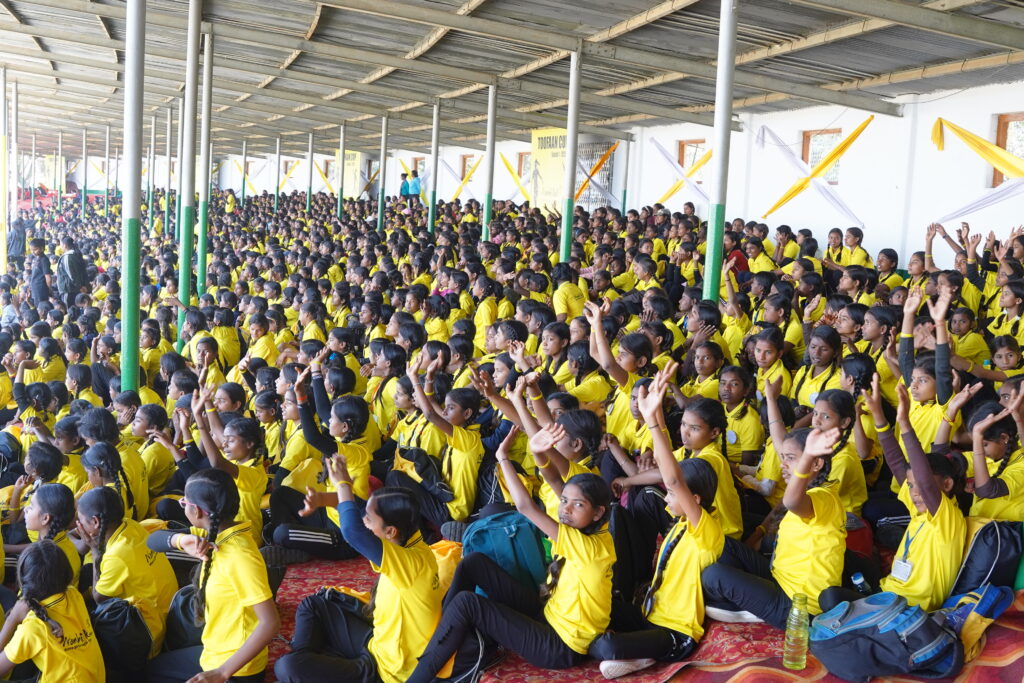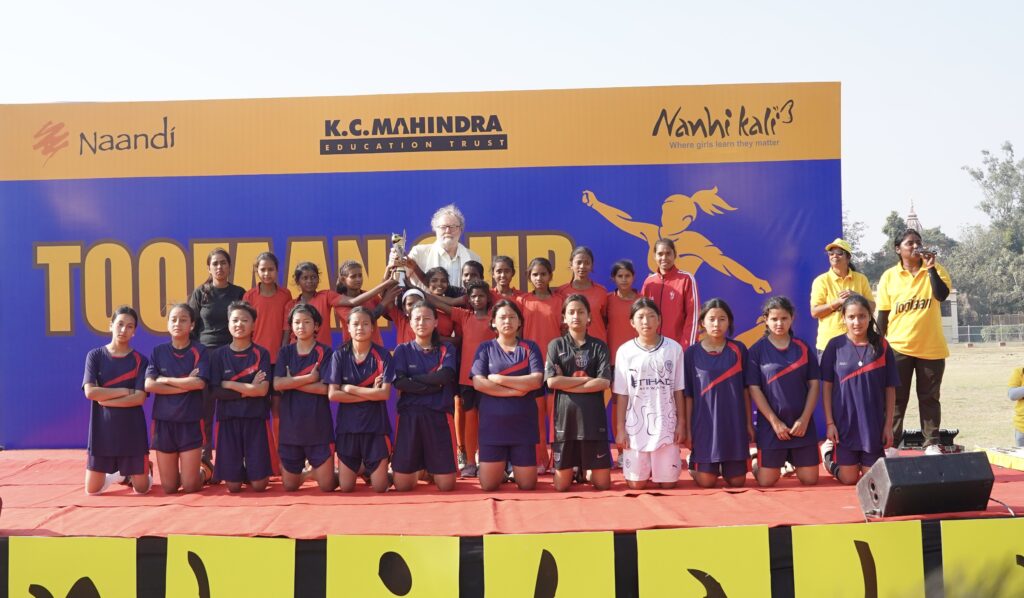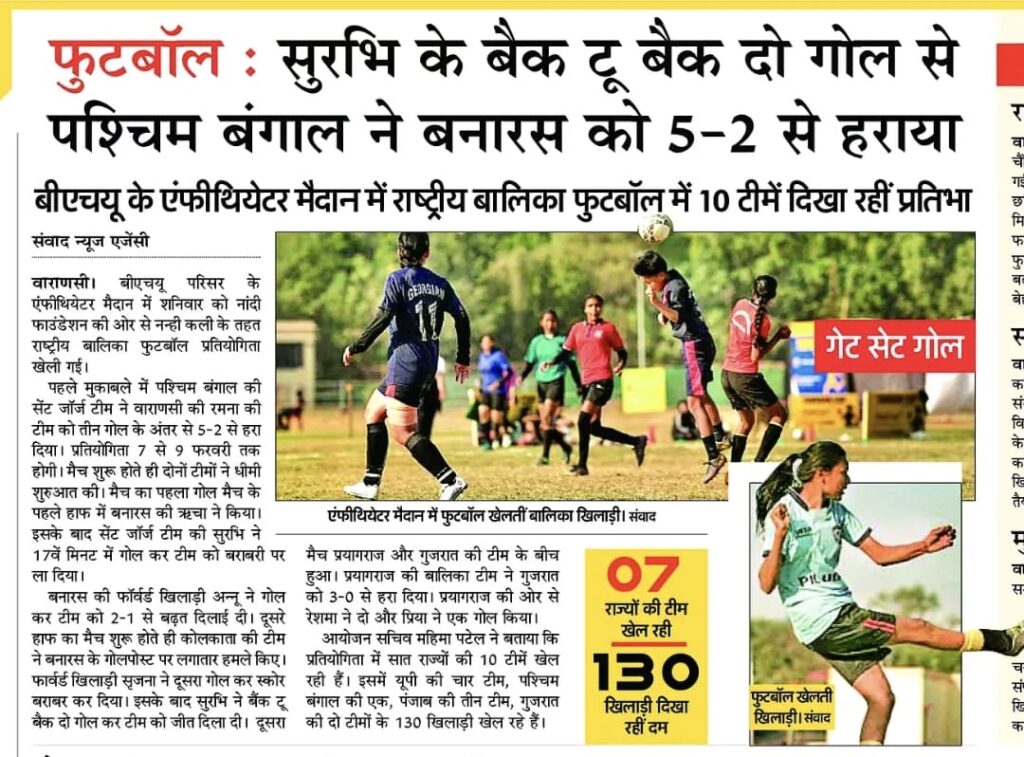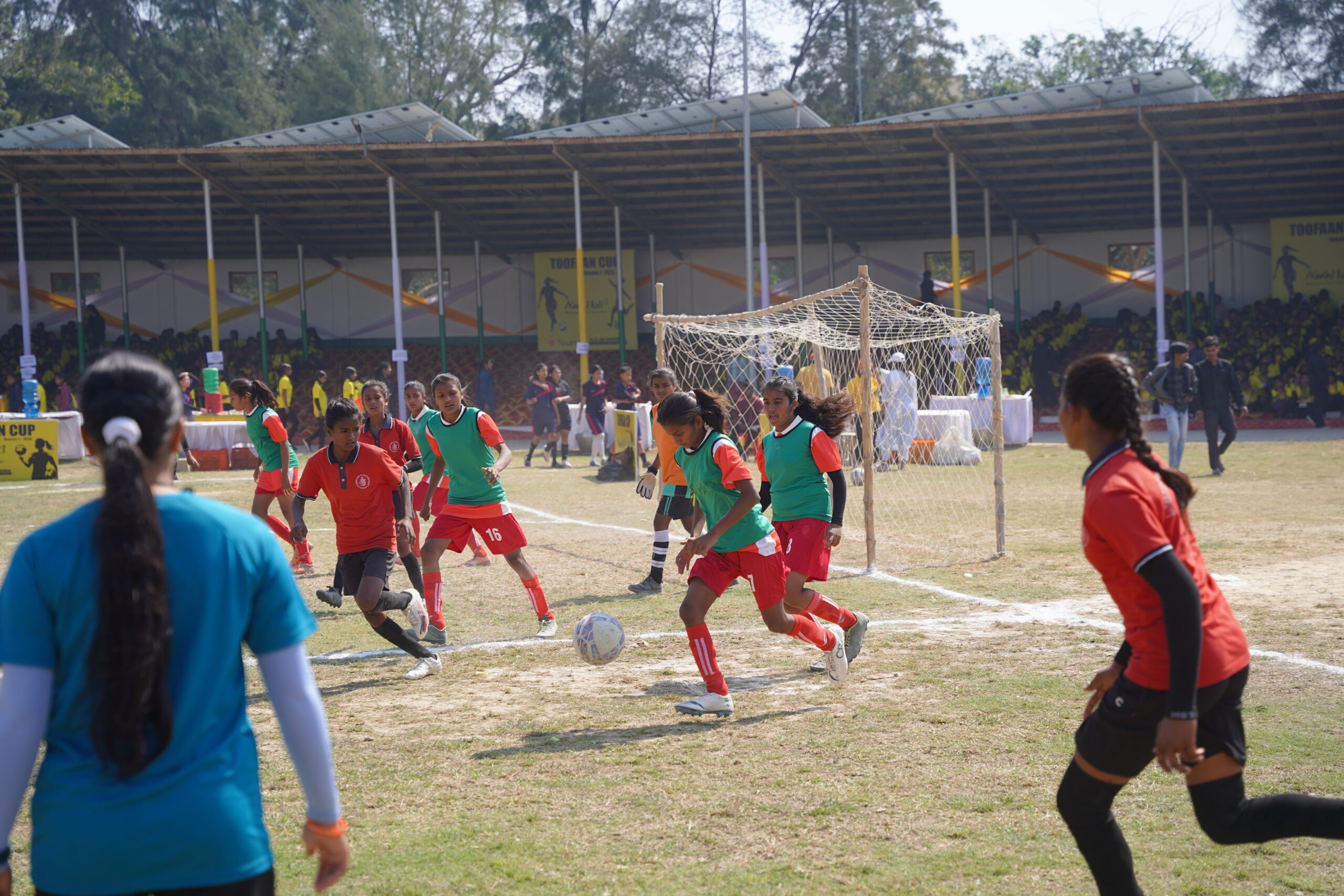For over 25 years, Naandi has remained a steady force in grassroots, women-led development, particularly in the fields of education, employment, and agriculture. There is, however, a particular field, a literal field, that we feel holds enormous potential to shape girls and young women into confident leaders. That field is a football field.
The fields we speak of are different from those you often see on sports TV. They are found outside villages and within school grounds and play grounds, and they are alive with the movement and encouraging shouts of young girls playing football, overseen by women coaches who understand their world. For Naandi, and for the 170,000 Nanhi Kalis and their mentors and sports coaches, we see and think of these fields as a symbol: the days of football as a male-only domain are slowly fading.
Building on the success of Toofaan Games – one of India’s largest athletic events for young girls – Naandi has launched its second national sports event: the Toofaan Cup. An annual football tournament hosted to spark the spirit of Nanhi Kalis and women who, like many boys and men their age, also love group sports and the thrill of a well-placed kick. Held in early February this year, at the BHU campus in Varanasi, the inaugural Toofaan Cup invited 10 football teams of talented young Nanhi Kalis from 9 districts spanning 4 states: Uttar Pradesh, West Bengal, Gujarat, and Punjab. Naandi’s core Sports team of women, comprising certified football coaches (aptly known as ‘Game-Changers’, some of whom have received AIFF certification), skills associates, and dedicated project managers and officers – all of whom form the backbone of Nanhi Kali’s thriving Sports for Life programme – spent months preparing for this event, united in their mission to nurture the girls’ potential.
Crucially, and in a feat rarely, if ever, witnessed in India or globally, this entire event, like all our sports initiatives, was managed and conducted exclusively by women. From gaining consent and organising safe transport for the girls’ travel, to marking the grounds with accurately measured chalk lines and checking the goalposts, to officiating as referees, keeping scores, and providing commentary – every aspect was handled by women. What makes this even more remarkable is that these are women from rural India, many of whom had never encountered or played with a football just two years prior.

These women ensured that the 10 teams of 119 Nanhi Kalis received a grand welcome on the first day of the three-day event—nothing less than they deserved after journeying from 9 northern districts to proudly represent their teams and play with the spirit of new sportswomen. Elevating their welcome was the crowd of 5,000 Nanhi Kalis from 60 schools across Varanasi, clad in their yellow sports uniforms and ready to cheer on their fellow Nanhi Kalis and friends. Their cheers and vibrant energy spread throughout the grounds, transforming the stadium and its atmosphere into a place where the unspoken barriers that often discourage girls and women from pursuing their passions dissolved, only to be replaced by a flourish of self-belief and a collective sense of awe.
The Toofaan Cup tournament unfolded with a series of matches held between two distinct “Pools”. Pool A, the 4 Master teams from Prayagraj, Varanasi, Darjeeling, and Jambusar, was formed by Nanhi Kalis who had dedicated over two years to rigorous football training. Their journey to the Toofaan Cup was paved with consistency and commitment: daily attendance at 2-hour practice sessions and at weekly matches and district-level tournaments. Pool B was composed of 6 Developing teams from Amritsar, Bhagapurna, Barabanki, Moga, Shravasti, and Varanasi, who represented the fresh energy of the Nanhi Kali football scene. These talented newcomers, recognised for their regular attendance and dedication to football activities held in the three months prior, were presented with invaluable opportunities to learn from their more experienced peers in Pool A. By observing Pool A matches, absorbing skills and strategies, and receiving encouragement, a bridge of knowledge and inspiration was formed between the two Pools.

The sheer scale of the event – with 119 participants, 30 coaches, 5,000 spectators, and additional guests – was yet another testament to the organisational prowess of Naandi’s teams. They arranged for the entire event to be broadcast live, so that all Naandites and family members could watch online from afar. One of their biggest feats was to prepare and hand-deliver two rounds of 5,119 consent forms to the parents/families of the attending Nanhi Kalis, ensuring that the first round was signed by hand to grant permission for their daughters’ attendance, and that the second round was signed to confirm their daughters’ safe return home. Furthermore, each day’s schedules and matches were carefully organised, with nutritious meals, ample water and snacks, first-aid teams, and crucial warm-up and cool-down sessions provided to ensure the girls and coaches were game-ready and protected from injuries.
Between the main matches, Nanhi Kalis, coaches, and skills associates had the opportunity to form new teams to compete against each other. These more relaxed games (with penalty shootouts thrown in for a small thrill) were important in blurring boundaries between age and roles, creating a feeling of togetherness and a shared love for football. On the last day of the event, all participating Nanhi Kalis were awarded a special medallion, a token to acknowledge their bravery and dedication to travel all this way and participate under the gaze of thousands of people. The winning team, Khweda from Prayagraj, was awarded a trophy, and the ten most outstanding players were further honoured with gold medallions, highlighting their remarkable sportswomanship.

The Toofaan Cup was a resounding success, drawing in distinguished guests from around the world and even capturing the attention of the local newspapers. Most importantly, it captured and broadcasted for all to see the powerful spirit and remarkable resilience of these girls and women who are leading positive change in their communities. Change which inspires girls to choose their own passions and lend their voices in defence of it, whether that be to better shape their own life or that of their friend, their sister, or their mother. Once again, the Nanhi Kalis and their Game-Changer coaches have shown that on the field and beside it, just as in life, they are a force to be reckoned with.




